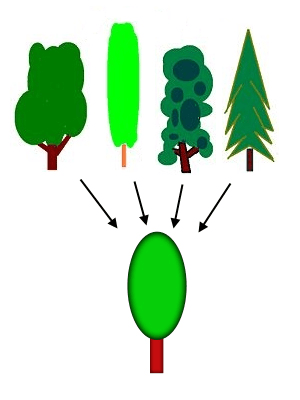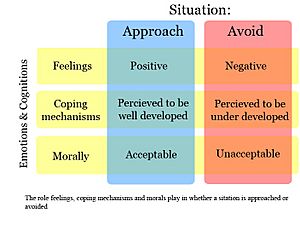Cognition facts for kids
Cognition is all about how your brain learns and understands the world around you. It's the amazing way your mind takes in information, thinks about it, and makes sense of it.
Think of it as your brain's superpower for knowing things! It includes many important skills, like:
- Paying attention to what's happening.
- Remembering facts and experiences.
- Solving puzzles and making choices.
- Understanding and using language.
Your brain does these things both when you're aware of it (like studying for a test) and sometimes without you even realizing it (like knowing how to ride a bike). Cognition helps you use what you already know and learn new things every day.
Scientists and thinkers study cognition in many different areas. These include psychology (how the mind works), neuroscience (how the brain works), education (how people learn), and even computer science (how machines can "think").
Contents
What is Cognition?
How Your Brain Thinks and Learns
Cognition is the process of getting knowledge and understanding through your thoughts, experiences, and senses. It's how you figure things out.
This includes many mental actions, such as:
- Knowledge: What you know.
- Attention: Focusing on something.
- Memory: Storing and recalling information.
- Judgment: Making decisions and forming opinions.
- Problem Solving: Finding answers to challenges.
- Language: Understanding and speaking words.
Your brain uses these skills to learn new things and build on what you already know.
Cognition in Daily Life
Every day, you use cognition without even thinking about it! When you read a book, solve a math problem, or decide what to wear, you are using your cognitive skills.
It helps you understand new ideas, remember what you learned in school, and even figure out how to play a new game. It's how your brain helps you navigate the world.
Where Did the Idea of Cognition Come From?
The word "cognition" first appeared a long time ago, in the 1400s. Back then, it simply meant "thinking and being aware."
But people have been curious about how the mind works for much longer. Over 2,000 years ago, a famous thinker named Aristotle was very interested in memory, how we see things, and how our minds create pictures. He wanted to understand how our inner thoughts affect what we do and how we feel.
Cognition in Psychology
In the field of psychology, which studies the mind, cognition is a very important idea. A long time ago, a thinker named Thomas Aquinas helped divide how we study human behavior into two main parts:
- Cognitive: This is about how we learn and know about the world.
- Affective: This is about how we understand the world through our feelings and emotions.
So, when psychologists talk about cognitive processes, they are looking at all the ways our minds work to understand, learn, and think.
Images for kids
See also
 In Spanish: Cognición para niños
In Spanish: Cognición para niños
 | John T. Biggers |
 | Thomas Blackshear |
 | Mark Bradford |
 | Beverly Buchanan |




